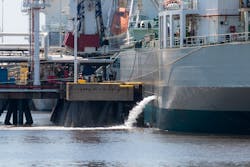Groups criticize exemption in new EPA ballast water rule
An organization of 40 conservation groups say a new Environmental Protection Agency (EPA) rule concerning ballast water discharges will not protect the Great Lakes from the spread and introduction of invasive species.
The EPA’s new rule, proposed in October, establishes national standards of performance for incidental discharges from commercial vessels as required under the Vessel Incidental Discharge Act (VIDA). The rule includes discharge-specific standards for 20 different types of vessel equipment and treatment systems, as well as general performance standards that would apply more broadly to the full range of incidental discharges.
The EPA rule has an exemption for so called lakers, or large ships that only operate in the Great Lakes. The conservation groups say these lakers play a significant role in introducing invasive species that can hurt outdoor recreation as well as damage pipes, pumping stations, reservoirs and other public and private infrastructure.
The groups say invasive species cost the Great Lakers region more than $200 million in damages and control costs each year.
The Lake Carriers Association, a trade group for the Great Lakes commercial fleet, had long pushed for an exemption to the EPA’s ballast water rule.
In a June 2016 press release, the association stated that “current EPA and U.S. Coast Guard regulations already exempt lakers from ballast water treatment and instead require extensive best ballast water management practices. Since the USCG began requiring mid-ocean exchange for other vessels, lakers have discharged approximately 66 billion gallons of ballast water from the lower Lakes into Lake Superior waters. According to the EPA, U.S. Geological Service, and National Oceanic and Atmospheric Administration, no ANS have been moved anywhere in the Lakes by lakers. Clearly, lakers are not the problem.”
Conservation groups, however, point to a study by the Great Waters Research Collaborative at the University of Wisconsin-Superior, which found that Great Lakes-only ships were spreading aquatic invasive species from one lake to another.
